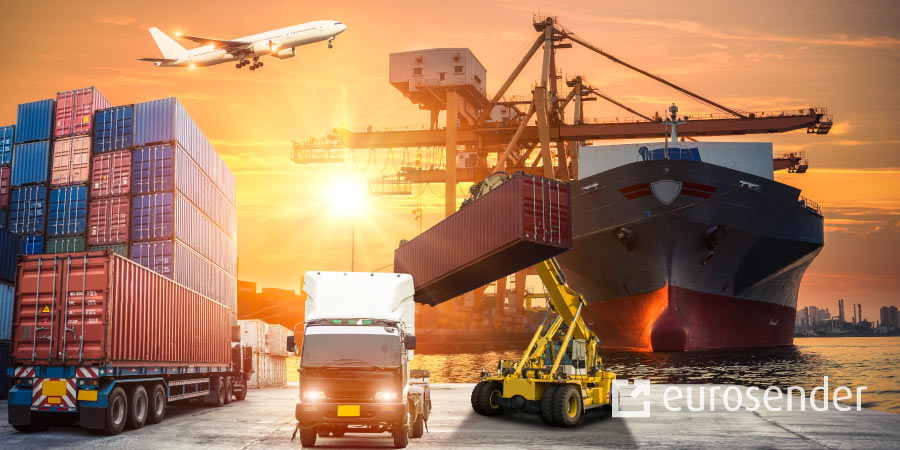Carrier vs Freight Forwarder: What’s the Difference?
Key takeaways
- Carriers transport goods using their own vehicles but do not handle customs or documentation.
- Freight forwarders organize the entire shipping process, including transport, paperwork, and storage.
- Choose a carrier for simple, short-distance shipments; use a freight forwarder for complex, multi-carrier logistics.
- Some companies act as both carriers and freight forwarders, offering full logistics services.
Although both have the same logistical scope of transporting goods, it is important to understand the differences between carriers and freight forwarders. Carriers are responsible for transporting goods while freight forwarders are responsible for organising transport. In this article, we have gathered the main characteristics about each type of service to help you understand the differences between carriers and freight forwarders.
You may also be interested in:
- The definition of a carrier
- The definition of a freight forwarder
- The definition of freight transport
Request an individual offer
What is a carrier in logistics?
Carriers are transport companies that move goods from one point to another using their own vehicles or chartered vessels. They focus exclusively on transport and unlike freight forwarders, carriers do not handle any bureaucracy regarding shipping documentation, taxes or customs clearance.
Since carriers specialise in the transport itself, they can often provide special logistics solutions, such as refrigerated transport. They usually have different types of trucks depending on the size or type of cargo that needs to be transported.
There are two main types of carriers in logistics:
- Common carrier – a logistics provider that offers transport services to any business or individual; they may work with various shippers
- Contract carrier – a logistics provider that offers services to a specific shipper according to a contract, which is usually long term
Read more about:
Carriers vs freight forwarders – carrier advantages
- Cost-effective, particularly groupage services, where costs are shared among shippers using the truck
- Specialised services and features, such as tail lifts and residential deliveries
- They transport multiple shipments at once, meaning fewer trips and fewer emissions
When to use a carrier?
It is beneficial to ship directly through a carrier if you are shipping on a smaller scale and don’t require multiple carriers. Establishing enduring relationships with carriers can prove advantageous to your business, as you may gain access to better shipping rates and improved reliability:
Continue reading:
What is a freight forwarder in logistics

A freight forwarder is the company or individual that organises the transport service by connecting shippers with the right carrier(s) to ensure cargo is moved in the best way. In other words, freight forwarders can act as intermediaries between shippers and carriers.
Freight forwarding companies arrange the shipping service even if it includes more than one type of carrier. For example, if you’re shipping goods from one continent to another, you may need a freight forwarder to arrange the delivery that will combine air transport, sea transport, and rail transport. Shipping that involves multiple methods of transport is known as intermodal shipping.
Arranging cargo transport can quickly become very complex, especially when intermodal shipping is required, but the purpose of a freight forwarder is to act on your behalf and arrange the right transport solution for your particular needs.
As we have seen, carriers focus on transport, but freight forwarders oversee the entire shipping process, and they offer additional services such as paperwork assistance and warehousing.
Choose the best freight forwarders here.
Forwarders vs carriers – freight forwarder advantages?
- Freight forwarders provide support with customs and paperwork
- They optimise and manage shipments for the best speed and cost
- They can provide additional services such as packaging and warehousing
When to use a freight forwarder?
If you’re having trouble managing all the complexities of shipping on your own, like finding the most efficient network and best pricing, it’s a smart idea to use a freight forwarder. With their expert knowledge and connections, they can help ensure that your shipment is delivered quickly and affordably. Plus, they will save you time and stress by taking care of all the logistics for you.
Summary of the differences between a carrier and a freight forwarder
When comparing carriers vs freight forwarders, you will see that both transport goods from an origin to a destination, but they have different roles in the logistics industry. These roles are where you will see the actual difference between carriers and freight forwarders.
Carriers are responsible for transporting cargo. They use their own vehicles and may specialise in different kinds of transport. However, they do not provide additional services such as storage or customs brokerage.
Freight forwarders organise the entire shipping process, including transport, documentation, warehousing and consolidation of goods from various customers. Freight forwarders normally do not own vehicles themselves.
Can the same company act as a carrier and a freight forwarder?
Yes, a company can act as both a carrier and freight forwarder. This has become increasingly common in recent years due to the development of transport technology and industry consolidation. For example, with advances in digital logistics platforms, carriers have been able to more easily expand their services to include cargo tracking, customs clearance, document processing, storage, and even product delivery. As such, many carriers are now also acting as freight forwarders so that they can provide comprehensive solutions for customers.
Read more comparisons:
- Difference between cargo vs freight
- Difference between freight forwarders vs freight brokers
- Difference between freight forwarding vs logistics
Carrier vs freight forwarder: Which to choose?
Choosing between carriers vs freight forwarders is not always so straightforward. Now that you know the differences between carriers and freight forwarders, you need to understand what your own requirements are.
We have gathered the tips below to help you make the right decision:
- If your logistics needs are not so complex, your cargo is being shipped short distances, and you are simply looking for lower shipping rates, a carrier would be the ideal choice
- If your logistics needs are complex and likely to involve multiple carriers, consider freight forwarding services and save yourself the headache of contracting various international carriers as well as a customs broker.
If you are looking for reliable logistics services with a wide range of freight shipping options, look no further than Eurosender!
Interested in learning more about pallet and freight shipping? Check all our articles about pallet deliveries.
Request an individual offer
About the author
Marcel Nahtigal is the Head of Marketing at Eurosender, blending creativity with data-driven strategies to revolutionize logistics.






